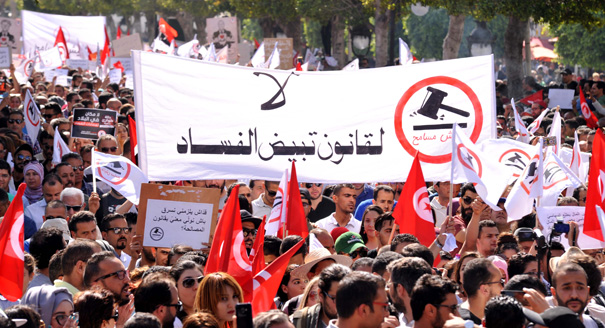Over the past six and a half years, Tunisia has spent more time and energy on the fight against corruption than perhaps any other aspect of the country’s democratic transition.
On January 15, 2011, a day after the departure of former president Zine al-Abidine Ben Ali, the provisional government established the Commission of Inquiry into Misappropriation and Corruption to address embezzlement and other forms of corruption under the ousted regime. Since then the government has adopted numerous laws and other official mechanisms to get to the root of this problem that has plagued the country for decades. Yet in a Carnegie survey conducted in July and August of this year, 76 percent of Tunisian respondents said they believed there was more corruption today than under Ben Ali.
There are two reasons for this. First, corruption was a taboo subject under the previous regime, so that while levels of corruption may not have actually changed, Tunisians today perceive more corruption because the government and the people are talking about it all the time. As one civil society actor explained during a Carnegie workshop in September, in 2011 people started to “wake up” and a “collective awareness [developed] of the need to deal with corruption.”
Second, Tunisia has undergone a democratization of corruption. That is, while under Ben Ali corruption permeated every sector, and embezzlement and nepotism were norms guiding his rule, only a handful of people close to him and his wife Leila Trabelsi benefitted from the Tunisian kleptocracy. Today, conversely, the tools of corruption are available to anyone.
Another challenge in the fight against corruption is that while Tunisians across the political spectrum, including government officials and civil society activists, agree that it should be a top priority of the government, various actors view corruption and how to address it differently.
The government has been primarily focused on addressing the corruption that has emerged since the revolution by enacting legislation to both sideline the bad actors taking advantage of the postrevolutionary environment and to deter future acts of embezzlement, fraud, and nepotism. Many civil society actors, however, are not ready to close the book on the Ben Ali regime and are still seeking justice for past crimes. Civil society has been a prime driver in pushing for a comprehensive transitional justice process that addresses both physical crimes, such as torture, and economic crimes, such as embezzlement and favoritism.
Thus, when civil society and government actors speak about corruption, they often speak past each other, leading to public anger over even the most well-meaning official anticorruption measures.
The most obvious example of this disconnect is the Administrative Reconciliation Law, passed by parliament on September 13, which provides amnesty to some civil servants accused of economic crimes under the Ben Ali regime. Civil society, under the umbrella of the “Manich Msemah” (I Won’t Forgive) movement, has been vocally critical of the law, which they see as circumventing the transitional justice process and undermining the democratic transition. However, the government, led by President Beji Caid Essebsi, believes that such a law would allow the country to move forward and focus on attracting foreign investment.
Both the Administrative Reconciliation Law and Prime Minister Youssef Chahed’s war on corruption, one of his government’s main priorities, are top-down measures that lack the necessary public buy-in to succeed in the long term. The war on corruption, which has so far mostly consisted of arresting top smugglers and shaking up some customs houses, has received mixed reviews from the Tunisian public since it was announced in May. While many within civil society applauded Chahed’s initial efforts, according to Carnegie’s survey, 64 percent of Tunisians think that the war on corruption will be “not successful.” As one civil society actor said in Carnegie’s workshop, many Tunisians do not understand what the war is about. Thus, the war “needs to define the enemy and be equipped with the proper tools.”
To address corruption effectively and sustainably, the Tunisian government can take several actions that do not require a tremendous effort. This can include implementing and enforcing existing anti-corruption laws, beginning with the law that requires officials to publicly declare their assets. The government should also prioritize the establishment of the constitutional court and ensure the independence of the Financial Judiciary Pole, tasked with investigating, prosecuting, and adjudicating financial corruption cases.
Additionally, the Tunisian government should undertake a few long-term and more costly steps such as digitizing government processes and streamlining the bureaucracy, to both build trust in government and ensure great transparency. Here, the international community can provide financial and technical assistance. International donors should increase funding for the National Anti-Corruption Authority, which is severely lacking in financial and human resources. Donor states can also work with private companies to invest in the country’s border regions, where the informal economy is dominant, by improving access to quality education and creating job opportunities outside of the public sector. This would create incentives for entry into the formal economy.
And civil society, with international support, should continue to play the crucial watchdog role, expanding to the local level to combat corruption as the decentralization process gets underway. Civil society groups should also work with donors to develop a public education campaign on how to access the judicial system to report corruption and Tunisia’s new whistleblower protection laws.
Corruption in Tunisia is a destabilizing force that infects all levels of the country’s economy, security, and political system. The Tunisian government, civil society, and the international community must work together to address corruption in the most effective and sustainable way possible to ensure that Tunisia’s transition remains on track.








